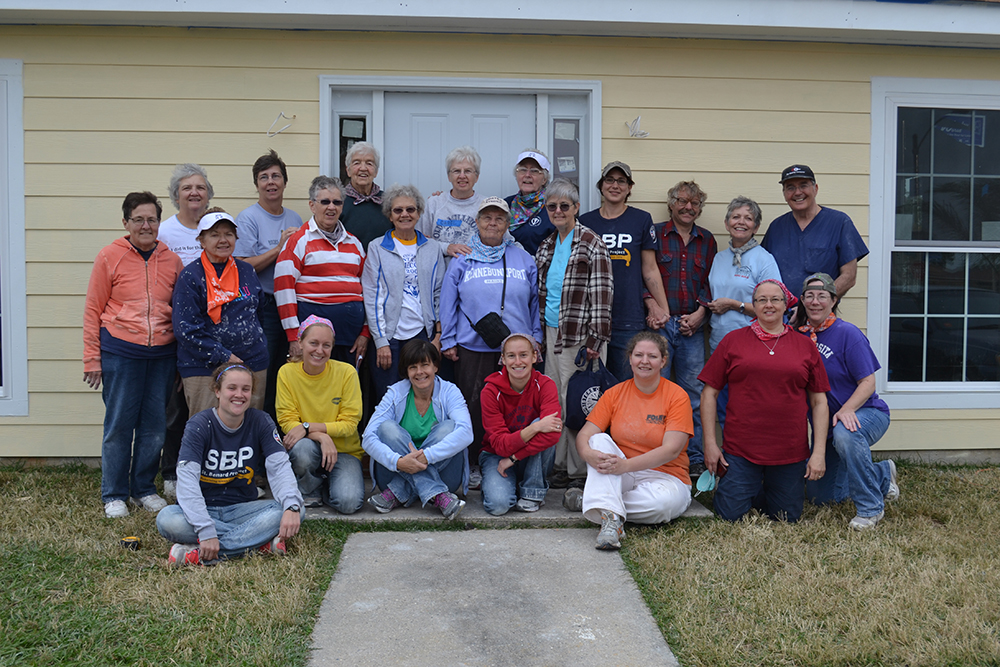
Julie Ferraro, kneeling at the far right of the front row, poses with a group of Nun's Build volunteers from multiple congregations helping at one house in November 2013. (Courtesy of the Sisters of St. Francis of Clinton, Iowa)
Twice in my life, I've visited New Orleans.
The first time, before Hurricane Katrina ravaged the city in 2005, I paid tribute to a deceased friend who'd always wanted to see the French Quarter.
The second time, nine years ago, three laypeople and I joined the annual Nun's Build, helping restore a home damaged by Katrina. We were associated with a women's religious community in various capacities and, since the sisters were aging, we represented them.
Nun's Build, coordinated by the St. Bernard Project, was a designated week in the fall of each year where sisters from across the country would gather for a week of intense physical labor. The other weeks of the year, volunteers from various organizations, colleges and so forth would do likewise.
During that week, in a home that had been completely gutted after the flooding, leaving only its outer shell, we installed insulation and drywall, painted and cleaned. While the young volunteer supervisors were great individuals, it proved really helpful that one member of our group had actually worked in construction and could assist in showing the sisters how to properly handle the tools and complete the tasks.
One of my more humorous, fond memories came from an evening trek into the French Quarter: All the volunteer sisters, ranging from those in formation to those vowed for many years, enjoyed socializing and relaxing. I was shooting a game of pool when I heard a song blasting from the jukebox. Looking up, I saw some of the sisters dancing to a song by the Weather Girls, "It's Raining Men."
I laughed at the irony — after all, a good song is a good song — and I still laugh to this day when I recall the scene.
How sisters represent themselves and how the laypeople associated with the various communities represent them has been the source of much discussion in recent years. It was a key topic at the North American Association of Benedictine Oblate Directors (NAABOD) conference at St. Meinrad Archabbey in southern Indiana in August.
For Benedictine oblates, it has long been a blessing to join the sisters or monks in the monastery for prayer, learn about the Benedictine charism and spirituality, and integrate that wisdom into daily life. Now, however, the number of vowed Benedictines is declining, and the oblates are being challenged to represent the sisters and monks more and more in the secular world.
The same can be said of religious communities — women's, especially — that have associate or affiliate programs of some type where the laypeople outnumber the vowed religious.
For vowed religious, representing their community in the public sector is a way to honor their founders, share God's love with all they meet, and stand up for those who have no voice. It's part of the job description, if you will; integral to the vocation.
Laypeople who declare their promise in whatever form to share the respective community's charism also become representatives of the community. Their choices impact the religious with whom they affiliate in a wide range of circumstances.
When they volunteer at a homeless shelter, soup kitchen or hospice, they credit the religious community with inspiring such service. Their ministries at the local parish do likewise.
But not every moment of the day is dedicated to representing the religious community. For those with children or extended families, events can sometimes bring discord or ill-timed behavior. A casual discussion about politics, for instance, can create a furor of anger or frustration.
Case in point, especially in recent years, when oblates or associates of a religious community have differing opinions about upcoming elections: On one particular occasion, an oblate believed it his duty to email the entire group of a monastery to express his doubts about the other members' faith and beliefs if they didn't vote for a certain candidate.
Politely worded objections to this tactic were met with terse and unyielding responses. That individual, in fact, resigned from the oblate group because the others refused to accept his statement as a mandate.
Advertisement
The excuse can be made, of course, that oblates or associates are flawed human beings — not to say vowed religious aren't also very human — and make mistakes or have lapses in judgment and common sense. Before they make any promises to their respective communities, though, there is a formation program where they learn more deeply about the community's history, charism and values.
If any individual does not agree with what is taught, he or she is free to depart the program. The underlying knowledge that one's actions will, going forward, represent the religious and reflect back on the community is vital in making the decision to approach the altar and speak the promises before witnesses.
As became clear at the NAABOD conference, laypeople are taking on more and more responsibility as associates of religious communities. The burden — or, rather, responsibility — to preserve the various charisms will fall to them as the face of religious life continues to change. Laypeople will need to adapt as monasteries or convents close and they are left without vowed religious to advise or teach.
By an individual's own actions, being able to proclaim their affiliation with a religious community — often without words, as St. Francis of Assisi preferred to teach — will be so important in the decades to come, especially when reports show Christianity will see a decline in the future. Associates of religious communities will become a true "voice of the voiceless" when those religious who have lived their vocation are gone, and they will spread the good news of God's compassion, the need for respect, equality and justice with the same spirit as their vowed mentors.
What better way to represent the women religious who have inspired and touched the lives of millions throughout history?
May we face the challenge with courage and keep their legacy alive.







